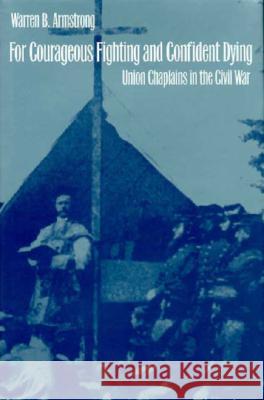For Courageous Fighting and Confident Dying: Union Chaplains in the Civil War » książka
topmenu
For Courageous Fighting and Confident Dying: Union Chaplains in the Civil War
ISBN-13: 9780700609123 / Angielski / Twarda / 1998 / 184 str.
When soldiers in the Civil War called on their religious beliefs in order to cope with the horrors of battle, many looked to the regimental chaplain for guidance and understanding. Clergy were always present to address the spiritual needs of the common soldier and administer to the wounded and dying. But as Warren Armstrong shows, military chaplains provided more than comfort.
In a country profoundly shaped by religion, each side adapted its version of Christianity to support its political views. This book documents the role played by Union chaplains in making better soldiers and supporting the North's military efforts. These ministers in uniform focused on preserving the Union and reminding soldiers that slavery was the central issue in the war, preaching the righteousness of abolition in services held in the mud of campgrounds, and often serving as advocates for freedmen. Armstrong has drawn on a wide range of documents to explain the duties of Union chaplains and differentiate them from their Southern counterparts. He examines the organization of the chaplaincy and reviews its manuals for guidelines on such matters as cultivating desirable character traits and building makeshift churches. He also sheds light on the personalities of the men who served, examines their attitudes toward the war, and assesses their unofficial role as morale officers for the Union army. Wherever possible, Armstrong uses chaplains' letters, diaries, and written reports to explain their thoughts and actions in their own words. His book is narrative history with a richly human element, including such episodes as a chaplain who took a fallen soldier's place and died in battle and two chaplains of different faiths who slept together for warmth on a cold winter night at Fredericksburg. Before the Civil War, the need for a military chaplaincy had been challenged on the grounds of separation of church and state, but the valiant service of chaplains during that conflict helped prove their worth and establish a lasting military tradition. In relating their story, Armstrong's work faithfully documents the contributions chaplains made both to the Union victory and to the form that victory took.










